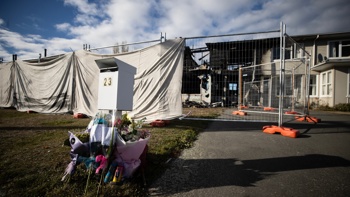
Gloriavale's Overseeing Shepherd was the ultimate controlling force as the employer of six women who worked on the Christian community's domestic teams, the Employment Court has found.
Chief judge Christina Inglis found Serenity Pilgrim, Anna Courage, Rose Standtrue, Crystal Loyal, Pearl Valor and Virginia Courage worked extremely hard under punishing conditions for years on end in a July decision declaring they were employees, rather than volunteers.
The ruling entitled the women to employment law protections.
In a further judgement released today, Inglis found the Overseeing Shepherd was their employer.
"I have formed the view that at all material times, the employer was the Overseeing Shepherd," she said.
"Essentially that is because the evidence pointed squarely to the Overseeing Shepherd, at any particular point in time, being the ultimate controlling force within the community, specifically (although not exclusively) in respect of work and in respect of the assets of the community."
Gloriavale submitted that if the women were employees, they were employed by Hopeful Christian in his capacity as Overseeing Shepherd until his death on 15 May 2018, and then by his successor Howard Temple.
The women agreed with that possibility, but argued as a fall-back position that Shepherds' Samuel Valor, Faithful Pilgrim, Noah Hopeful and Stephen Standfast were also employers.
However, Inglis found the Overseeing Shepherd pulled the strings and was the final arbiter in all things, regardless of who held the role at any particular point in time.
"While it is true that the Shepherds play an important role, including in relation to work undertaken within the community, by whom and when, they are not the ones who ultimately pull the strings. The ultimate string-pulling function, and entitlement to do so by virtue of the community's foundational documents, sits firmly with the Overseeing Shepherd," she said.
Inglis said the Overseeing Shepherd's evidence reinforced the centrality of his role as leader of the community in all aspects of spiritual and practical life.
"While he delegated certain functions in the teams to, for example, the House Mother, and regarded himself as a 'hands off manager', he readily accepted that as Overseeing Shepherd he retains ultimate control," she said.
"The reality of the community's operational structure and way of life, who does what, when and how within the Gloriavale internal world, is that it is the role of Overseeing Shepherd, not the individual, which carries the ultimate authority within the community."
Determination of the women's employment status is the "gateway" through which they must pass before making claims for lost wages, breach of minimum entitlements, compensation and penalties.
The women's barrister Brian Henry said they were pleased the judgement provided clarity.
"The decision by chief judge Inglis paves the way for us to continue the fight for justice for our clients which includes filing in the courts against the Labour Inspectorate and seeking financial redress for loss of wages and compensation for the terrible breaches of law and appalling treatment these women have had to endure," he said.
Henry said he expected Gloriavale to appeal the decision.
"Gloriavale is a large, well-oiled machine worth around $65m and in possession of significant assets. There are 65 million reasons to keep fighting this to achieve the justice these and many other former Gloriavale victims, are entitled to," he said.
In her July judgement, Inglis found the women were primed for work on Gloriavale's domestic teams and taught from birth to submit to male leadership in all aspects of their lives.
They worked full time when they left school at the age of about 15.
The women were responsible for preparing food, cooking, cleaning and doing the laundry for Gloriavale's 600 members, arguing they worked under an all-pervading regime of secular and religious control.
Gloriavale's bid to appeal against Inglis's finding that the women were Christian community employees was largely dismissed by the Court of Appeal in a judgement delivered last week.
The appeal court declined leave on the four questions of law Gloriavale's identified and invited submissions on a further two "narrower" questions that could have wider significance for religious or volunteer organisations.
Jean Edwards, RNZ
Take your Radio, Podcasts and Music with you









